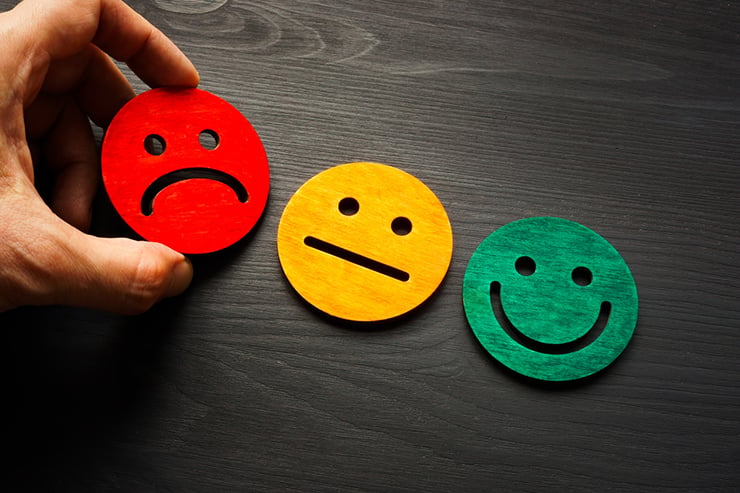One of William F. Buckley, Jr.’s most anthologized essays is his 1961 “Why We Don’t Complain?” It is about the human tendency to quietly accept the inevitability of finding oneself in bad situations. Published in Esquire, Buckley recounts several events during which he did not complain, but in retrospect, he probably should have done.
On one occasion, the train on which he was traveling had a faulty furnace, and while the temperature outside was below freezing, inside it was 85 degrees. Naturally, everyone was too hot, but nevertheless quietly suffered, saying nothing to the conductor.
On another occasion, Buckley was in the theater with his wife, Patricia. The film was completely out of focus. Buckley knew what ought be done, namely that he should talk to the theater manager and alert him to the problem so it might be fixed. But, neither Buckley nor Patricia nor anyone else in the audience uttered as much as a peep. They collectively suffered through a rather bad aesthetic experience.
Buckley wonders why? In the essay, he considers this a distinctly American trait, and one that often extends beyond such minor grievances. This sort of milquetoast (to use a great WFB word) approach to life especially affects us in the American political sphere. “Our notorious political apathy,” writes Buckley, “is a related phenomenon [to our disinclination to complain].
Every year, whether the Republican or the Democratic Party is in the office, more and more power drains away from the individual to feed vast reservoirs in far-off places; and we have less and less say about the decisions which shape our future. From this alienation of personal power comes the sense of resignation with which we accept the political dispensations of a powerful government whose hold upon us continues to increase.”
Even though Buckley wrote these words in 1961, they still resonate today. Add to the mix the phenomenon of today’s “uniparty” and the ideological capture of globalists, and the rest applies even harder. But what are we to do? How do we complain? Does this kind of resignation begin with “alienation of personal power” in our daily experiences? Perhaps it does. In my own life, I have noticed that as I try to suffer through whatever unpleasant thing is happening to me, to reach into that inherent stoic self and just be quiet, and get over it, there can be even more unpleasant consequences. Things may not get done or I may stay in the same leaking boat until the last board gives, and I end up really lost at sea. So, shouldn’t I complain?
Buckley recognized the value of politeness but it is important to understand where the line is between being polite and allowing bad behavior or injustice? Better yet, when does the fake political politeness toward an opponent constitute letting go of one’s responsibility and the right to demand the upholding of the order of things?
In recent years, this has become a familiar theme among certain conservatives, who are apparently convinced that it is a bedrock principle to remain polite and civil to political opponents who, quite simply, call for our existential destruction. But why should we remain milquetoast in the face of evil? The boat has already been rocked thousands of times by forces that are interested only in maintaining their power and hold over the people.
Of course, some would argue that today’s society is oriented toward those who are complaining too much, but I think a distinction must be made between legitimate complaint and whining. We witness whining in our culture on a daily basis. Consider just the latest example from Vanderbilt University, the site of another student protest. What the students were protesting is irrelevant; it’s the fact that a 911 call was made to proclaim a tampon emergency for one of the students. The student who called, apparently, was not allowed to use the bathroom and declared it an emergency because she needed to change her tampon. The 911 dispatch was confused as to the nature of emergency, and of course, did not consider it be worthy of attention.
We shouldn’t be surprised at this. Much of this sort of infantilizing attitude and helpless whinging started on college campuses, beginning with the notion of “safe spaces.” That culture is spreading a sort of primitive emotionalism to civilized society at large. Suddenly, those we have been conditioned to consider adults have become more like toddlers having temper tantrums.
So, it is true that people have become more whiney than before, even as they have become more apathetic when they ought to complain. Apart from the high profile cases of censorship that drift into the “worthy of real complaint” category, most of social media is designed to encourage people to use their virtual soapboxes without real consequences (apart from negative feedback from users). One can and often does whine in a way online that he couldn’t get away with doing in a face-to-face meeting.
Again, whining is not synonymous with complaining. Buckley is not advocating whining because a complaint, by its nature, is directed to action: to solving a correlated and particular problem that should be addressed. But there is something worth considering for us today in Buckley’s recognition of a connection between our disinclination to complain and an unmanly acquiescence to power.
“When our voices are finally mute,” writes Buckley, “when we have finally suppressed the natural instinct to complain, whether the vexation is trivial or grave, we shall have become automatons, incapable of feeling.” This is entirely different from made-up, fantastical, and ideologically induced grievance airing. It is about affirming our humanity and our right to be heard as citizens with concerns directly relating to our responsibilities as individuals and members of a community.

Leave a Reply